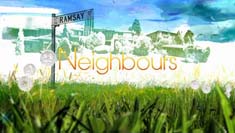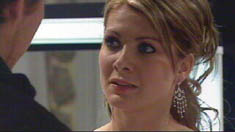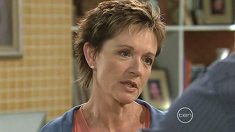|
.
Interviews
> Sarah Mayberry
|

|
She's worked as a Neighbours scriptwriter and storyliner, and has been responsible for many of the defining moments in the life of Izzy Hoyland. Here, writer Sarah Mayberry looks back on her time writing about the residents of Ramsay Street...
Can you give us a background on your career and involvement in the television industry prior to Neighbours?
This is easy - none! Well, mostly. I have a degree in Professional Writing and Literature and I spent six years in trade journalism and eighteen months as communications manager for Mitre 10 Australia before I scored a job at Neighbours. So, I had worked as a writer for many years. And I was constantly working on my own fiction projects - book submissions and whatnot. I had actually written scripts for the show a few years prior to working for them full time, a gig I got by doing a script submission. I found it quite hard to get my eye in, however, from the outside, and only did a handful of scripts at that time.
How did you first come to work on Neighbours?
I'm afraid my story confirms what a lot of people say about TV - it's not what you know, it's who you know. (Although I'd like to think that what I know played a small part, too!) I think the big thing is that most jobs in TV aren't advertised like "normal" jobs - you get wind of them by word of mouth, or you get recommended by someone, whatever. Anyway, to my story: my partner was working in-house as story editor. Over the years that he'd worked there as a storyliner and script editor, I'd seen firsthand what a great job storylining was. And I'd helped him come up with ideas - you know, just chatting on the couch at home, passing on stories I'd heard. He kept encouraging me to try for a job because he thought I had a talent for story, but I didn't want to work at the same place that he did. Talk about a fast way to kill a relationship! But at a certain point he decided that his stint in the story ed's chair was going to be his last with Neighbours at that time, and a job came up on the table... So I put my hand up for it, took a week off from work and tried out on a volunteer basis (ie unpaid) for a week. I loved it and Ben Michael offered me a job after three days. And it all went on from there.
Were you a fan of the series before joining the crew?
Yes. Obviously, because my partner was working on the show, I watched a lot. But I'd always watched, always been a fan of Neighbours and not Home and Away. Maybe because it was set in Melbourne, but also because I always liked how warm and grounded in normality the show was. Sure, it gets a little crazy sometimes, but it always comes back to home and hearth. Through my teen years, I watched all the stuff with Charlene and Scott - God, their weddings was so sob-worthy, especially for a future romance novelist - and listened to that Angry Anderson song over and over again.
As well as writing scripts, you also spent two years as a storyliner, between 2001 and 2003. What does this job involve? Were you responsible for creating any key characters during this period?
Basically as a storyliner you are helping to come up with every scene in the show, five eps a week, 48 weeks a year. It's a gruelling, crazy, hilarious, emotional job. There are usually four storyliners and one story ed. Starting from Monday, we all sit in a room and spitball big shapes for the week. We're obviously picking up stories that we left at Friday's episode of the week before, as well as kicking off new ones. Where do those stories go next? What direction do we go in? Sometimes there's a big, overreaching plan for major stories and that's all worked out in advance - things like Steph's cancer story, Susan's MS - major, big story arcs. But also you're looking for stories that might just last a week, or sometimes just a few days. Hopefully, by the end of that Monday, we've got some shapes in place for the week. Tuesday, we sit down and start plotting in earnest. Scene one, Monday ep, off we go.
I've worked with different story eds, all of whom have their own way of plotting. Some will divide the episode into A, B and C story strands and plot the scenes - or story beats - for each story separately, then weave them together at the end when they've all been plotted. Others will plot as the episode runs - what do we need to see first? What do we cut away to? What next? Typically, we're looking for 18 to 20 scenes per episode. There are location restrictions regarding how many outside or non-studio scenes we can have every week, and how many different places we can shoot those scenes in. There are also cast restrictions. There are also limitations on how many guest characters we can use, and there is generally a push to keep the drama playing out between our regulars, both for budget and audience reasons. Most watchers want to see things happening to the characters they know and love, not some newcomer to the street. As a storyliner, I used to sit there thinking "how would I feel if this was me?" And "is it in X's character to say/do that?" The story table demands that storyliners and story eds offer up a lot of their own lives, memories, experiences and the experiences of people you've known to the story gods. This is where stories come from, after all - imagination + human experience.
Typically, one storyliner writes the scene breakdown for one episode a week, but because there were usually only four of us, the fifth episode was usually split between two storyliners. We rotated who that was on a weekly basis so no one got bogged down with a higher workload than anyone else. Once the Monday episode was plotted, the storyliner writing that breakdown would leave the room and head off to write it up. And so on for the rest of the episodes. By Thursday, the Monday and Tuesday ep storyliners were usually back in the room, helping to plot the Friday ep. Then the story ed and story/script producer would read the eps, give us back notes to change things for continuity across the block, story tweaks, whatever. Then the whole block would be released as a draft document to be read by the higher powers that be. And, when they had all said their two cents worth, the block would be released to the freelance scriptwriters who would turn the storyline into a script.
|

|
As for any characters that I was instrumental in helping create, it's very hard to take responsibility for creating anything entirely on your own on the story table. You have an idea, someone else jumps on board with it, before you know it everyone is batting it back and forth, adding detail here and there. It's very collaborative - which can be both exciting and invigorating but also frustrating when you have a very clear, vivid idea of where a story/character should go but you are the only one who believes in it. I do remember the discussions we had around Izzy Hoyland, however. We decided we needed a villain with the demise of Darcy (oh, Darcy, how we loved you!). We wanted to have a woman for a change, and we were throwing around a lot of ideas about what kind of woman she would be. I suggested we keep her a smaller, more human villain, rather than going larger than life like Pat the Rat or something like that. A woman who was both charming and selfish but also damaged and vulnerable in her own way. A charmer of men, someone who was needy and constantly manipulating people to cover her own failings and lies. This was based on a woman I had seen in action at around that time - one of those people who is constantly telling people what they want to hear, then going into the next room and blithely betraying the first person to get the second person to like her. This was one tiny seed of the discussion from which Izzy grew - and you know, if you asked other people who were at that meeting, there's a fair chance they might remember that they contributed a great deal to her character, too. The story table is like that.
You wrote several key episodes for the character of Izzy Hoyland – including her arrival, her departure and her doomed wedding to Karl. Was she a character you enjoyed writing for? What do you feel about newcomer Nicola West and criticisms that she’s too similar to Izzy?
You know, I only realised the other day that I wrote those kind of book end moments for Izzy - I'm sure it was just a coincidence in terms of the writer's roster, but it was great to play with her. She was a fun character because she always had an agenda and good attitude - there's nothing worse than a bland character whose voice you can't hear in your head when you're writing. Izzy was also so selfish and self interested that you could get some great inadvertent comedy out of her. And great sadness because she was such a train wreck emotionally. I can understand why Nicola is being compared to Izzy - young, blonde, out for herself. I'm not surprised they decided to look at another femme fatale like this, given Izzy's success. Izzy made such a huge impression, partly because she messed with the Kennedys so badly. I am sure Nicola will carve out her own place in the history of the show. After so many years, those stand out characters are harder and harder to come by.
Other than Izzy, who have been your favourite Neighbours to write for?
I love writing for Toadie, because he has such good heart and that sparky, sarcastic sense of humour. He's also very human and full of the kind of doubts that a lot of people have. Steph is good, too, because she has a strong voice - straight forward, no bull. Susan and Karl banter is always a gift, and a good Kennedy fight is manna from heaven. Lou and Harold are two more strong comic/character voices. Often the hardest voices to find are the teens - unless they have a very distinct personality like Sky. Finding the thing that makes them tick, their little quirks and interests, is often the key there.
Do you have any scenes or moments you wrote that you were particularly pleased with?
Well. There are probably quite a few - I think I've written more than 50 eps now. The one that really jumps to mind is Izzy and Susan's confrontation in the street, the one where Susan just lets rip. I agonised over that scene and must give credit where credit is due to my partner who helped me workshop those fights. Great fun. There have been countless Karl and Susan scenes I've loved over the years - Alan and Jackie are such professionals and they always bring it to the table. It's funny, but I can remember plotting more scenes that I loved more than writing them! Moments like Drew's funeral - because of the way that all worked out with the actor's contract, his death had to be backplotted and a former story ed was brought in to work with me on going back into already written blocks and plotting his death and funeral. We worked in a little side room for a week or two sorting it all out. The writers did an amazing job with those scripts. I still tear up every time I think of Libby singing at his funeral. And the moment when Steph rides back into the street after leaving Max and he's putting the rubbish out and she tells him there was something she forgot and kisses him... And that great confrontation in the street between Steph and Flick after Mark has looked at Flick during his wedding vows and the marriage has fallen apart.... There are tons of moments like that.
How does a typical writing assignment on Neighbours work for you?
As a freelance writer, we get two weeks to write a script from the scene breakdown. The first step for me is reading through the ep I've been assigned. I like to let it percolate in my subconscious for a few days before I actually start writing. In that time, I read all the scene breakdowns since my last script up to that point to catch up with what's been happening. Then I set up my Final Draft file and start writing. Sometimes the scenes come easily. Sometimes they are agony. Sometimes I need to ring up and clarify something with the story ed or script eds. Sometimes I understand what the point of the scene is and decide to come at it from a slightly different angle than what's specified in the scene breakdown. After so many years, you get a feel for what is set in concrete and what isn't. But I also know how lovely it is as a storyliner to watch a scene on tape and see essentially what you imagined in the room when it was first discussed. So I try to respect that, too. Sometimes what was discussed in the room is the only way to go because they hit gold straight away.
What do you think are the strengths and weaknesses of the Neighbours format?
I think it boils down to one and the same thing - it's set in a suburban cul-de-sac. So, people are thrown together, there is a sense of involvement and community. But there is also a limit on credibility regarding the kind of "big" stories the show can do well. Home and Away can do an earthquake, for example, or a fire,or a cult, etc, without appearing too ridiculous. But an earthquake on Neighbours would be hard to pull off. And we have to go away to location to do a bushfire and it's hard to have it threaten local businesses etc. I do think the show has enormous heart. People care for each other. I also think that the show does soap cliches well. When we decided to give Susan amnesia, I was very worried about how the story would play out. But we did amnesia in a small, real way, I think. No one forgot they were the princess of a far flung European principality - Susan simply forgot the people she loved. Which was heart breaking. Mining the small hurts, joys, betrayals, jealousies and dreams of "ordinary" people is what keeps the show grounded, I think.
|

|
How important is the comedy in Neighbours, in your opinion? Is it something that you’re particularly conscious of when writing for the show?
Hmmm. I know some people love the more silly comedy stories (Toadie's masked wrestling, for eg). For me, I think there are certain characters who can get away with that stuff, but I think that the show is at its best when the humour is character based - Karl being a scrooge, him and Susan bantering, romantic comedy tension between Steph and Toadie, the teens humiliating themselves in a situation we've all experienced. I think humour is an important part of the show - Neighbours has never taken itself too seriously - but I also think that the audience of today demands more hard-driving stories that pull the audience in and won't let them go until the end of the half hour. I really enjoy writing sparky dialogue between characters (hopefully it's sparky, anyway!). I love the irony of some of the situations the characters end up in.
You’ve also worked as a writer on the New Zealand soap Shortland Street – how did this compare to writing for Neighbours?
It's a medical show, so automatically there is an excitement element coming into the show every episode - life and death situations, high stakes, pressure. New Zealand has some fantastically talented actors for such a small country - they really fight above their weight in that regard. The show is the highest rating drama on air, I believe, and has been for a long time. It's a real staple of most Kiwi's TV diet. That brings a certain amount of pressure to bear, too - gotta keep those ratings high! They typically shoot more scenes per episode, and their cast can be in every episode if needed. So that makes story-telling different. I have never written scripts for the show, only ever worked as a storyliner and story editor. I am too busy with my books and Neighbours work now to fit more work in.
What do you most enjoy about your involvement with Neighbours?
I like feeling connected to a larger enterprise. As a freelancer, I spend most of my time at home alone (hence the rambling length of this interview!), so it's nice to have that contact with other writing folk, even if often it is only via the internet. Also, because I'm mostly writing books now, keeping my hand in with dialogue hopefully keeps my other writing fresh, and vice versa. Often it's very satisfying writing a script, too. If it's a storyline I really connect with, it's a great experience. As an aside, I am very proud of the show's heritage. It's such a touchstone of Australian culture - the amount of times it's referenced in books, songs, comedians' acts, etc is amazing. It definitely deserves more respect than it gets. I challenge anyone who disses it to spend a week on the story table so they can see what an amazing job the show does creating 2.5 hours of commercial TV a week. Think how long it takes to make a movie, which is only 90 minutes. Years! And yet Neighbours manages to entertain every weeknight.
You’ve been a Neighbours writer on and off since 1998 – how do you believe the show has (or hasn’t) changed during that time?
It's so hard for someone on the inside to answer this objectively because you're so involved with the material you work on personally. With the sale to Channel 5 in the UK, the old war horse has come back into the limelight. This means added pressure for everyone and should be a solid part of the show surviving in the face of an increasingly fragmented television market. I think there has definitely been a push to create more high-stakes, gripping stories, and I think they are doing a good job of that and retaining the heart and warmth of the show.
What do you think accounts for the huge success Neighbours has continued to enjoy over the past 24 years?
I think it offers us a version of real life that's tinged with comedy, hope and drama. It's our lives x 10, sort of. There's a sense of community which many of us crave ( I don't know my real life neighbours, I don't know about you, and I think people crave that kind of connection, even if it is just in theory and having Mrs Crabapple appear on the doorstep every day for a chat would drive you nuts). There's lots of romance, which appeals to everyone, I believe. Neighbours has a strong moral compass - people who do bad stuff usually get their comeuppance. It's bright. It's often funny. I think the show often workshops problems that real people have. Heartbreak, infertility, betrayal, jealousy, thwarted ambition. And it's Australian - people have bbqs, wear thongs, kick footys, go to the beach, and say things like "fair dinkum". I think we underestimate how important and satisfying it is to hear our own voices on TV instead of Americans running around with guns in their hands. And I think the British like it for many of the same reasons, and because Australia has always been a land of sunshine and opportunity and equality to them.
|

|
As well as being a scriptwriter, you also write romance novels, and were responsible for three of the novels released in 2005 to mark Neighbours’ 20th anniversary. Can you tell us a little about that?
Sure. I write for Harlequin Mills and Boon, and I am currently finishing my 13th book for them. The books I write are under the Blaze line and are rather...saucy. Quite different from Neighbours, really, and probably not something you want your kids reading! My first book, Can't Get Enough, was the inspiration for the episode where Karl and Izzy got stuck in the lift together. Ben Michael shamelessly stole my plot, but I loved it! My next book is out in November '08 in Australia - Below The Belt. It's about a woman boxer and her trainer. Stuff happens, in and out of the ring. People can find excerpts from my books on my website, www.sarahmayberryauthor.com The site is looking a little ordinary at present due to my web designer disappearing, but the links to my books are still there if anyone is curious.
I have also written a kids book which was a novelisation of a Kiwi TV series called The Lost Children, for Penguin books in NZ. And I had the good fortune to co-create a teen TV series in New Zealand called Karaoke High. It screened during summer of 2007 while Shortland Street was on its yearly break. That was great fun and a real joy. And I shamelessly employed every technique I'd ever learned from Neighbours and Shortland Street to keep the show interesting.
As for the Neighbours books...well. I had just sold my first Mills and Boon when they approached me, and overnight I went from having one book published to being contracted to write three. It was a little scary. The stories all had to be "bubbles" ie, about stuff that wouldn't affect ongoing story. So, I chose people who had left the show (Flick and Michelle, Nina and Jack) and went back 15 or so years to tell Liljana and David's backstory. All the books were great fun to write, but I loved Flick and Michelle's the most because it has strong romantic elements in it. Although they all ended up being romances in the end - I couldn't help myself. If I had my time again, I would pay closer attention to the production process - I didn't get a chance to proof read my books and there are few things I would have loved to have been able to catch - like referring to Nina as Delta in one part of the book. Oops!
What's next for Sarah Mayberry?
More books. More scripts. I have been helping research a few feature film ideas over here in New Zealand, which has been fascinating and great fun. More travel. More shoe shopping. Oh, and one day I'd love to write a best selling romantic comedy book. So...I should probably stop rambling on and get back to work. Thanks for the interest, it was fun writing and thinking about all this stuff.
Interview by Steve. Added on 27th September 2008
Back
|

